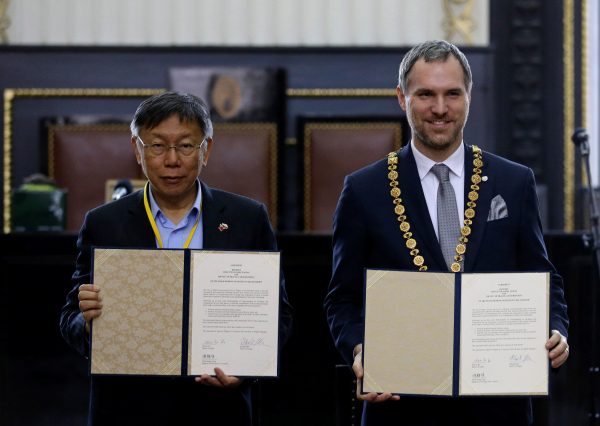Before becoming a politician, Ko was a physician. Jerry Liu, a political opinion writer and former candidate for Taipei City Council, says Ko’s training to save patients shaped his political beliefs, which are centred around solving problems.
These ideals influenced Ko’s unique approach on a number of policy issues. For example, he fixed the Beimen traffic congestion problem by rationalising the flow of traffic. In May 2015, he ordered a halt to construction on the Big Dome Stadium upon discovering that construction was not following the approved blueprint, creating greater density and a fire hazard.
In an effort to provide more affordable housing, Ko established his policy of ‘Housing Justice 2.0’ which seeks to build 50,000 new public housing units over eight years. Ko promised that 20,000 units would be completed by the end of his first term. But by August 2018, only 2600 units had been built. He responded to criticism by explaining that targets for public housing were subject to change. While public housing provides low-cost rental units for young people so they can save enough money to buy their own dwelling, Taiwan has a cultural aversion to renting. People want reasonably priced houses and most communities do not want public housing.
Ko is a financial disciplinarian who believes that debt should not be passed on to future generations. In 2014, Taipei had a debt of NT$146.8 billion (US$4.95 billion). By 2020, Taipei’s debt stood at NT$89.8 billion (US$3.03 billion). This is in contrast with Taiwan’s second biggest city Kaohsiung, where debt ballooned from NT$120 billion (US$4.05 billion) in 2007 to NT$240 billion (US$8.10 billion) in 2017. Kaohsiung responded by saying that Taipei had previously borrowed central government funds to build their metro and that it was now Kaohsiung’s turn to build major infrastructure.
One of Ko’s big accomplishments was the successful hosting of the 2017 World Athlete’s Competition — the Summer Universiade. As a result, he became increasingly popular and began to be seen as a presidential contender. But this also meant he was seen as a threat to incumbent President Tsai Ing-wen, his relationship with the DPP became acrimonious, and the DPP ran its own candidate in the 2018 Taipei mayoral election against him.
Ko narrowly won re-election by 3567 votes. In addition to his struggles with the DPP, Ko also lost support from many young voters due to his stance on cross-Strait relations and equivocating on the Hong Kong protests. In an April poll conducted by the New Power Party (NPP), only 11.4 per cent of the 813 respondents rated his performance satisfactory. Additionally, in an April Global Views Monthly poll measuring popular satisfaction in managing the COVID-19 response in the six major cities, Ko was actually ranked second to last.
In his March 2019 visit to the Heritage Foundation in Washington DC, Ko promoted a policy of staying close to the United States but being friendly to China. The DPP tends to paint Ko as ‘red’ given his friendliness to China, and his views on the US Indo-Pacific Strategy are still unknown.
Despite his foreign policy stance, he signed a sister city agreement with Prague to which China was strongly opposed. Gordon CH Yang, Taipei City Executive Director of the International Affairs Advisory Council, says that Ko ‘advocates not irritating China to find common ground to build mutual understanding and trust between China and Taiwan. Ko disagrees with Tsai’s nationalistic stance towards China. He believes that her overall economic transformation plans cannot be achieved without better relations with Beijing’.
Ko is active in the Taipei–Shanghai Forum and has averred that people on both sides of the Taiwan Strait are one family. Beijing feels a relationship with Ko will enhance its rapport with young Taiwanese, although he has lost much appeal among young people because of his views on cross-Strait relations and a reluctance to speak out about civil unrest in Hong Kong.
Just like Ko’s approach to government, he emphasises transparency in the affairs of the Taiwan People’s Party (TPP). He devotes time to the TPP Academy and training candidates for future elections. He wants the TPP to be independent of other parties and attributes the downfall of the NPP to its close relationship with the DPP.
But can the TPP compete with the two main established parties? A weakened Kuomintang (KMT) beset with internal tensions could facilitate the rise of the TPP while also attracting some more moderate DPP voters. In the 2020 presidential and Legislative Yuan elections, Gordon CH Yang says, ‘Han Kuo-yu was not a good candidate and lacked KMT support. People liked Tsai but many did not like the DPP because it became too nationalistic. Consequently, the TPP was able to win five seats [264,478 votes in Taiwan’s constituencies and 1,588,806 votes through proportional representation] in the legislature without endorsing a presidential contender’.
Ko is a force in Taiwanese politics. His chances for victory in the 2024 election will be influenced by how he directs TPP members of the legislature to liaise with other parties on certain issues and how to vote. The TPP’s legislative record and ability to navigate between Taiwan’s green and blue coalitions will determine Ko’s shot as a presidential candidate in future.
Bill Sharp is a visiting scholar at National Taiwan University.


Excellent analysis